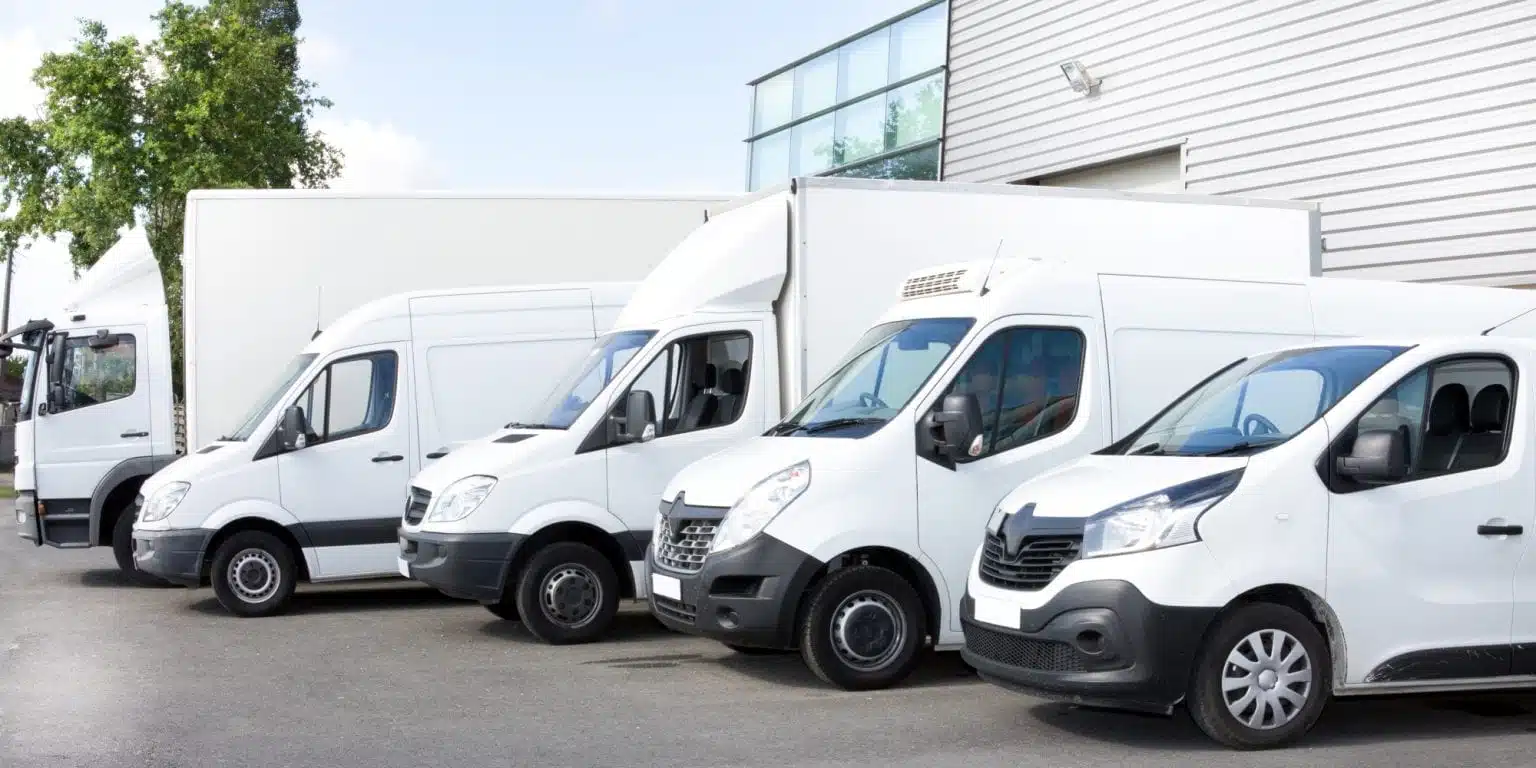
Moving Truck Sizes, Explained: Picking the Right Option for Your Move
Moving Tips and Hacks
If you have the time, capability, and DIY motivation, renting a truck and moving yourself may seem like a no-brainer. Especially if it means saving a ton of cash and giving you more control over the process than you would get with hiring full-service movers. But there’s one important factor that could make or break your moving experience: understanding moving truck sizes to make sure you get the right vehicle for the job.
In this guide, we’ll help you make that all-important decision. We’ll discuss all the factors to consider when picking a moving truck, including thinking “outside the box.” (Get it?) But first, let’s talk about the basics: What are the different moving truck sizes, and what types are available for rent? Then, we’ll help you answer the most important question: How big of a moving truck do I need?
Moving Truck Sizes
There are three main types of rental vehicles that can help you with your self-move: flatbed trucks, cargo vans, and box trucks. Moving truck sizes are selected based on how much stuff you’re hauling, so if you wonder, “What size moving truck do I need?,” use these descriptions as a starting point as you figure out the best rental trucks for moving your home on your budget.
| Q: What are the different sizes of moving trucks? A: Moving truck sizes vary, from a flatbed truck or cargo van (the smallest) to a giant 26-foot box truck. In between those two options are sizes typically ranging from 10 feet to 22 feet. Depending on the size of your home and the distance you need to go, you’ve got plenty of options — as long as you do your homework. |

Only moving a few pieces of furniture? Instead of sorting through moving truck sizes, you can likely use a flatbed truck instead.
Flatbed Trucks
Flatbed (or pickup) trucks are great for short, local moves that involve just a few large furniture items, like a mattress and a kitchen table. You can take the furniture and appliances in the truck and load smaller boxes into your personal vehicle. You can rent flatbed trucks from traditional truck rental locations, but they are also available from some hardware stores, like Home Depot.
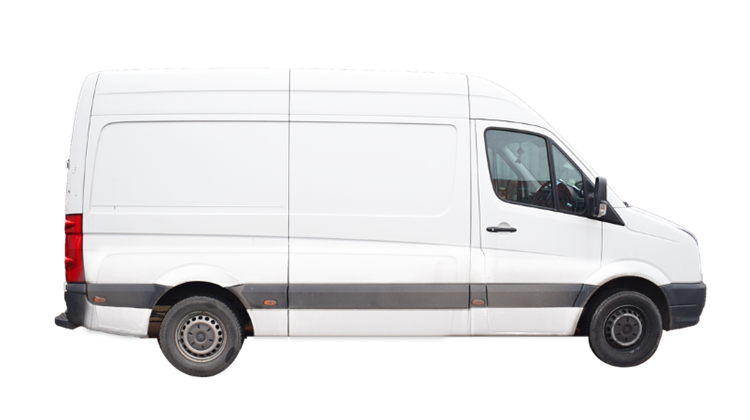
(Source: S. Weis)
Cargo Vans
Cargo vans may not look big from the outside, but you might be surprised by how much they fit inside. If you’re moving a studio apartment, college dorm, or even a small one-bedroom apartment, you may be able to fit most of your belongings into a cargo van. If you’re scratching your head trying to figure out “What size moving truck do I need?” and you live in a small apartment, a cargo van could be the answer.
| Q. Is a 15-foot moving truck big enough to handle my move? A: There is no one-size-fits-all when it comes to moving truck sizes, but a 15-foot truck is a happy medium for many moves, particularly for a single person. For a studio or one- to two-bedroom apartment, a 10- to 18-foot truck is a typical rental truck size. If you’re looking for a more flexible moving solution, though (a one-day move can be stressful), you could also opt for a 16-foot PODS self-storage unit, so you can pack up over time and then decide to ship the unit to your new home, or, if it’s in your budget, put your belongings in storage for a bit. |
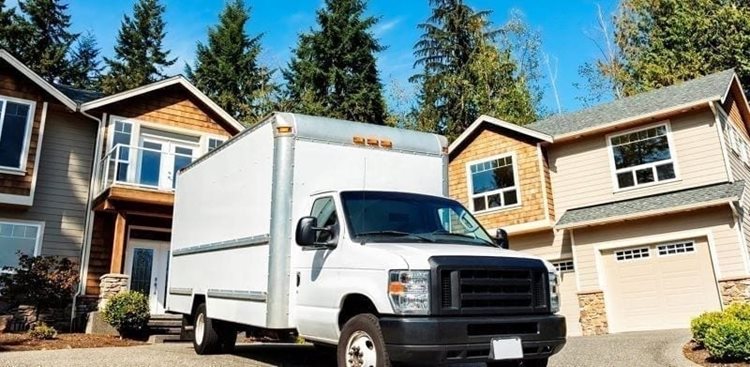
The typical moving truck sizes for an average household are around 16 to 20 feet.
Box Trucks
Most people think of box trucks when they hear “moving truck.” These are the real heavyweights of self-moving, and they tend to be the best option for most relocations — especially long-distance moves on a budget.
But how long is a moving truck? What moving truck sizes are available? Every company will have slight differences in their rental moving truck sizes, even if it’s just the height or width of the loading door. In general, though, you’ll be looking at standard box truck sizes ranging from 10 to 26 feet.
Recommended Moving Truck Sizes
Here’s a breakdown of the recommended moving truck sizes based on your home type and square footage. We’ve also added the equivalent sizes for moving storage containers and storage units, for reference.
What Size Moving Truck Do I Need for a Small Studio Apartment (<400 sq ft)?
- Rental Truck Size: Cargo van or 10' box truck
- PODS Container*: 8'**
- Self-Storage Unit: 5' x 10'
What Size Moving Truck Do I Need for a Studio or 1-Bedroom Apartment (600 sq ft)?
- Rental Truck Size: 10', 15', or 16' box truck
- PODS Container*: 8' or 12'
- Self-Storage Unit: 5' x 10' or 10' x 10'
What Size Moving Truck Do I Need for a 1- or 2-Bedroom Apartment (800 sq ft)?
- Rental Truck Size: 15' or 16' box truck
- PODS Container*: 16'
- Self-Storage Unit: 10' x 15'
What Size Moving Truck Do I Need for a 2-Bedroom House/Apartment (1,000 sq ft)?
- Rental Truck Size: 15' or 16' box truck
- PODS Container*: Single 16' or 16' + 8'
- Self-Storage Unit: 10' x 15' or 10' x 20'
What Size Moving Truck Do I Need for a 2- or 3-Bedroom House/Apartment (1,200 sq ft)?
- Rental Truck Size: 15', 16', or 18' box truck
- PODS Container*: Single 16' or 16' + 8'
- Self-Storage Unit: 10' x 15' or 10' x 20'
What Size Moving Truck Do I Need for a 3-Bedroom House (1,600 sq ft)?
- Rental Truck Size: 20', 22', or 26' box truck
- PODS Container*: 16' + 8' or Two 16'
- Self-Storage Unit: 10' x 20' or 10' x 25'
What Size Moving Truck Do I Need for a 4-Bedroom House (2,000 sq ft)?
- Rental Truck: 26' box truck (may take multiple trips)
- PODS Container*: Two 16'
- Self-Storage Unit: 10' x 30'
*Suggested container sizes are for guidance only. Larger items and how efficiently containers are loaded can significantly impact the size and quantity of containers you’ll need. **PODS is constantly upgrading its container fleet, and container sizes may vary slightly from one model to another.
| Q: What can fit in a 12-foot moving truck? A: A 12-foot moving truck has 515 cubic feet of space, which means it’s large enough to hold the furnishings and items you keep in one to two rooms (or around 3,800 lbs). But if you have several large items — a piano, for instance, or appliances like a washer/dryer and refrigerator — you may need to consider upgrading to the next size. |
Tips for Choosing the Perfect Moving Truck Sizes
These moving truck sizes should help you get an idea of what you need, but there’s more to consider than just moving truck length. Here are six tips to also consider when answering the question, “How big of a moving truck do I need?”

(Source: Christina Morillo)
1. Using a Moving Calculator Can Be a Game-Changer.
Comparing moving truck sizes based solely on current square footage or the number of bedrooms may not be the most accurate way to decide what to rent. After all, some folks stuff a lot more into 1,000 square feet of living space than others, right? So sometimes, it can be helpful to use a moving calculator to help determine the truck size you need.
This tool is available on many moving sites. In fact, on some, you can select the actual items that you’re moving from a list and receive a more precise estimate of what size truck you’ll need.
| Did you know? Moving calculators aren’t just for trucks — they can also help you determine what portable storage container size will work best for your specific situation. |
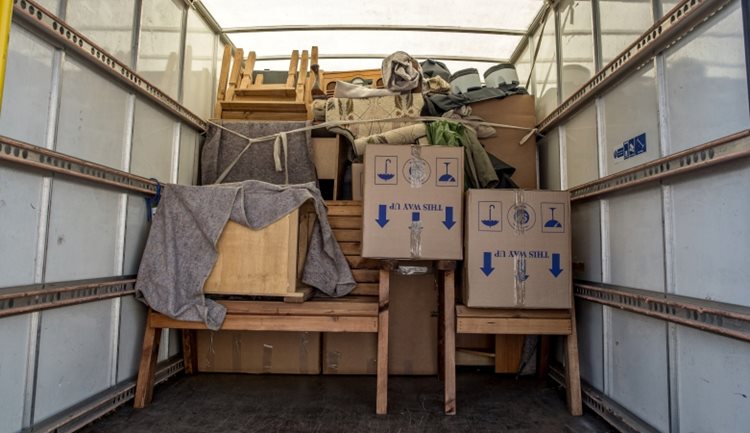
Distribute weight evenly and use all vertical space when loading the truck.
2. Loading Efficiently Is Just as Important as Choosing the Right Truck.
You can choose the biggest option of available moving truck sizes, and it still won’t fit all of your stuff if you load it like most people pack a suitcase for a weekend trip. Efficient, safe, and easy loading takes planning. Some of the most important things to remember are to:
- Use high-quality packing materials, like new boxes and plastic bins.
- Break down bigger items like bed frames and tables whenever possible.
- Load your items tightly to avoid shifting..
This is where those Tetris skills come in handy. And packing and loading guides, of course. These guides can show you the best order for loading your big and small items, and they can also show you how to keep your belongings safe and secure while you’re hauling down the highway at 70 miles per hour.
| Q: How big is a 26-ft moving truck? A: A 26-ft moving truck has up to 1,700 cubic feet of interior space and is ideal for loading five to seven rooms’ worth of stuff. Using a moving calculator, we packed up an imaginary four-bedroom house and were able to fit: 45 large boxes; 20 medium boxes; 4 beds (a king, queen, double, and twin); 4 double dressers; 2 tall bookcases; an entertainment center; a 65-inch TV; a sectional sofa; a dining table and chairs; a WFH setup, including a desk, chair, and standing monitor; 4 rugs; a cat tree; a bar cart; a coffee table; an ottoman; a piano; and a pool table. |
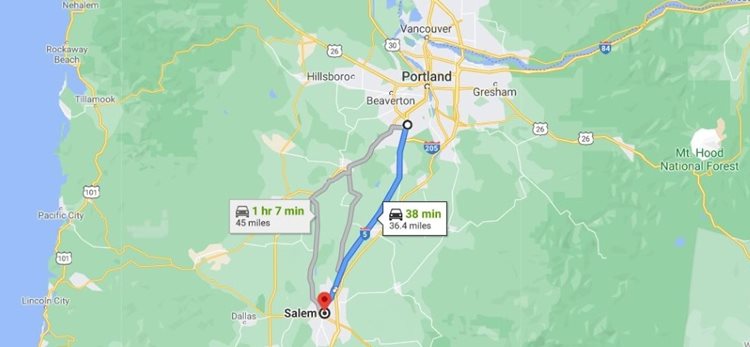
Don’t plan for multiple loads and trips if you’re moving far from your current home.
(Source: Google)
3. Moving Can Mean Multiple Trips (and That’s A-Okay).
If you’re just moving down the street — or even across town — consider getting a smaller (and cheaper) moving truck and making multiple trips. This might sound like a pain, but it can cut down on potential budget woes and the stress of loading everything at once (and you’ll probably enjoy the nice reprieve that the driving time will give your muscles).
Of course, if you’re going a long distance, you’ll want to make sure you can take everything in one load. Nothing is worse than renting a truck, loading it to the brim, and then realizing that you still have a chest of drawers and four big boxes that didn’t fit! Needless to say, it makes sense to size up when choosing a rental truck for long-distance moves.
| Q: Is a 26-foot moving truck big enough to handle my move? A: A 26-foot truck is at the large end of moving truck sizes, so generally speaking, you should be able to fit most of your belongings if you live in a three- to four-bedroom home (for a one- or two-bedroom, you may find the truck is too spacious). If you’re asking yourself, “What size moving truck do I need for a 4-bedroom house?,” the answer is likely a 26-foot truck. If you live in a larger home, or if you’ve lived somewhere for a while and have accumulated lots of loved items over time, you may need to make multiple trips. Alternatively, you could rent that 26-foot truck and rent an additional PODS container on the side, where you can store furniture that may not fit with your new home’s style or purpose — if, say, you’re a new empty-nester, you may not need those twin beds anymore! A PODS container can stash those nostalgic belongings away for now or create a temporary space to stash them while you figure out where to donate or sell them. |

Ask yourself if you’re comfortable driving one of the larger moving truck sizes before you commit to renting a moving truck.
(Source: Ingo Joseph)
4. Staying Comfortable and Confident While Driving Is a Must.
Unless you have a commercial driver’s license, you’re probably not used to driving a ten-ton truck through busy city traffic and onto the freeway. Take your driving comfort level into consideration before choosing a truck that’s 20+ feet long — and check out these moving truck safe driving tips.
And if you’re not so confident in your (or your spouse’s) driving skills, consider getting a smaller vehicle or looking at other moving options. Which brings us to our next tip. . .
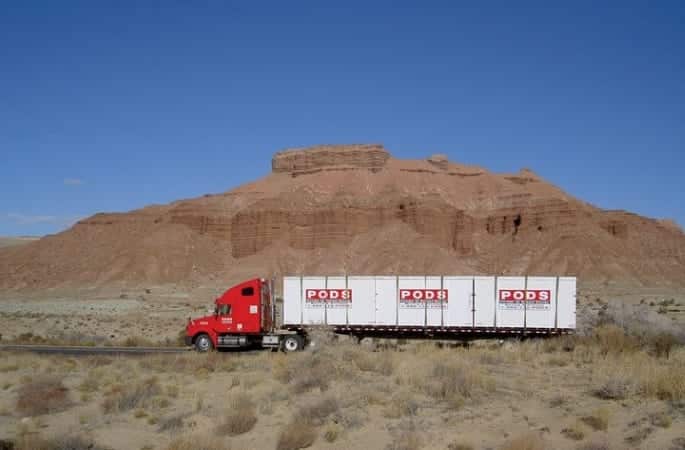
With PODS, you don’t have to drive your own moving truck.
5. Considering Other Options May Make Sense for Your Situation.
Sure, renting a truck and moving your own stuff can save you money and give you full control of your move. But before you commit to hauling everything yourself and becoming an expert in professional moving truck sizes, you might want to consider other options, such as:
Moving Storage Containers
If you’d rather skip the driving altogether — and get flexible, affordable storage solutions — you might want to opt for a moving container, like those offered by PODS. These secure containers let you pack up your belongings over a longer period of time, and they’re shipped directly to storage or to your new home when you’re ready.
Full-Service Movers
Hiring full-service movers can make things much easier for you and your family. Movers can pack, load, drive, and unload everything for you. The catch, of course, is that it can cost thousands of dollars, depending on the distance of your move.
A Mixture of Moving Solutions
Sometimes, it makes the most sense to try a combination of more than one moving solution. For example, if you’re trying to downsize and declutter as you move, you can consider loading up a moving container and sending it to storage, then loading the rest of your stuff into a box truck and driving it to your new place. Because you’re separating items — likely by need or importance — you can devote more time to focusing on getting your new home the way you want it rather than wading through boxes of items that can be organized at a later date.
Other Hybrid Moving Solutions Include:
- Moving most of your items in a portable container or rental truck and letting movers take care of heavy or fragile items.
- Hiring labor help to pack and load your items — or just the heavy stuff — so it’s like a full-service move using a container.
- Using a portable container and then renting a truck to “finish the move” and transport leftovers or essential items for use in temporary housing.
Example Cost Comparisons: Moving Truck Rental vs. Full-Service Movers vs. PODS Portable Containers***
Local Move (in Washington, D.C.)
- Moving Truck Rental: $42 to $106 (plus fuel costs
- Full-Service Movers: $649 to $2,254 (includes transport and loading/unloading)
- PODS: $435 to $749 (includes transport and 1-month storage)
Long-Distance Move (NYC to Tampa)
- Moving Truck Rental: $823 to $1,575 (plus fuel costs)
- Full-Service Movers: $2,350 to $5,557 (includes transport and loading/unloading)
- PODS: $3,031 to $4,926 (includes transport and 1-month storage)
***Based on estimates from PODS and MoveBuddha for a 2-3 bedroom household (800-1,200 sf) as of December 2024. Costs don’t include insurance or taxes. Prices will vary based on specific locations, dates, size of household to be moved, and available discounts. For a detailed quote, call PODS at 877-350-7637.

Moving can be stressful, but there are ways to make the process easier physically and mentally.
(Source: Ketut Subiyanto)
6. Going Slow and Staying Safe Is the Name of the Game.
The last (and possibly most important) tip we’ll give you is this: Take it easy! Moving can be stressful, but it shouldn’t be dangerous. If you pack too fast, things might break or get lost. If you load too fast, you could hurt yourself. And if you drive too fast — well, just don’t.
In addition to taking care of yourself physically, don’t forget that mental fatigue can cause some wear and tear, too. Try to maintain a positive mindset and use coping mechanisms to identify and alleviate stressors before they spiral out of control.
We hope that this guide to moving truck sizes has helped you figure out a little piece of the puzzle. And we wish you a safe and smooth moving adventure, wherever you’re going!
Easton Smith works as a freelance writer and researcher, reviewing technology trends and the moving industry. He moved all around the continent, from New York to California, before landing back in his hometown of Salt Lake City.
Related Articles
Comments
Leave a Comment
Your email address will not be published. Required fields are marked *
